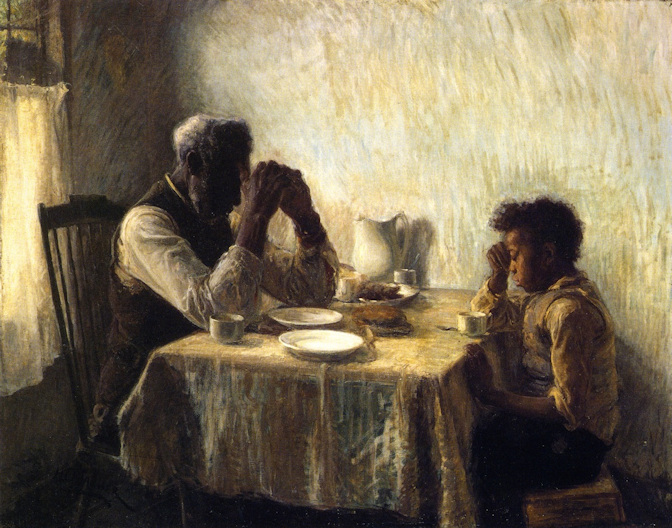
More classic art masterpieces used as illustrations
TL;DR:
Psalm 121 proclaims that our help comes from the active, attentive Creator who watches over us. In contrast to fatalism, which views life’s events as fixed or determined by chance, this devotional calls believers to an engaged, trusting faith. Though we may not understand life’s hardships, we can live confidently, knowing that God is personally involved in human affairs. The closing acrostic on “Fatalism” poetically depicts the bleak inevitability of a fate-driven worldview that Scripture refutes.

What does Psalm 121 mean for us today?
1 I lift up my eyes to the mountains
where does my help come from?
2 My help comes from the Lord,
the Maker of heaven and earth.
A few days after our return to Italy from our first home assignment year, I was in the apartment of an Italian woman. Our conversation turned to spiritual matters over a cup of espresso in her small, high-ceilinged kitchen. She is not a born-again Christian, although her daughter and son-in-law had been converted 15 years previously.
"I believe in fate," she suddenly said to me. "Whatever is meant to happen to you will happen."
When I started to protest, she continued, "How else do you explain why a man is hit by a car as he crosses a certain street corner? He could have crossed somewhere else or waited a moment and lived. It's all up to chance or fate."
That can be a tough argument to counter. In fact, in my book, Paul McGrady: Mr. Evangelism, I did not feel competent to speak to the why? of the death of an evangelist-professor in the prime of his life and ministry.
Let it be said, however, that I believe in David's Holy Spirit-inspired words in Psalm 121:8: "The Lord will watch over your coming and going both now and forevermore".
Life is more than a mere chain of circumstances that we cannot control. Satan too often lulls us into accepting a view of life like this woman's. Sometimes we Christ-followers even say, "Well, that's the way life is."
But is it only that? Isn't there a Creator who is indeed active on our behalf? Didn't the Holy Spirit inspire David to write, "The Lord watches over you -- the Lord is your shade at your right hand" (Psalm 121:5)?
With my limited human point of view, I don't have all the answers to the questions of life. I don't know why we are sometimes dealt such hard blows. But I know there is much more at work than mere fate or chance. When we find ourselves living on the level of this woman who has little conscious realization of God's presence, we must remember to ask ourselves with David, "Where does my help come from?" (v.1)?
Help does come from the Lord! That's David's view of life expressed in Psalm 121. We are aware of God, who never tires of being our Keeper. And we have the opportunity to express often, both to ourselves and to others, our faith in a God who is intervening in our affairs.
We need not live our lives resigned to fatalism. Our thoughts do not have to be formed by a viewpoint that smacks of obliviousness to God's presence and action.
Let's put our faith actively in the Lord Jesus Christ. Our Messiah is all that David pictures Him to be in Psalm 121, and He is even more.
-- Howard Culbertson, hculbert@gmail.com
I wrote this devotional blog post while Barbara and I were serving as missionaries in Italy. It was published in Standard, a weekly Faith Connections take-home curriculum piece for adult Sunday school classes produced by The Foundry.
The concepts of fate and fatalism have long fascinated philosophers and writers grappling with the mysteries of existence. Fate embodies the notion that events are often beyond human control or influence. Instead, they are predetermined and inevitable. Fatalism extends this idea to suggest that, in the end, human actions are futile in the light of an unchangeable destiny. "Whatever is going to happen is going to happen," some people say, shrugging their shoulders.
Evangelical Christians reject fatalism. By contrast, they point to the importance of personal choice, accountability, and God's sovereignty. They believe that while God may have a plan or purpose for individuals and events, humans still have the ability to make choices and influence outcomes through their actions. They believe that through prayer, obedience to God's Word, and reliance on God's grace, people can understand and fulfill their purpose within what God desires for what He has created.
"Whatever will be, will be" is a common English phrase expressing the idea that the future is beyond our control, and things will happen as they are meant to, regardless of our efforts. It can conveys a sense of fatalism. This phrase became widely known from the 1956 song "Que Será, Será (Whatever Will Be, Will Be)", made famous by Doris Day in Alfred Hitchcock's film The Man Who Knew Too Much.
F - Fate decides the path we take,
A - All events are preordained,
T - Time unfolds as if by script,
A - Actions bound, yet unexplained.
L - Life’s course is preset,
I - Inevitable twists cross our way,
S - Shadowed hands shape night and day,
M - Mortals bow to inevitable fate.
The word "faith" as an acrostic
Like acrostics? Here are more of them